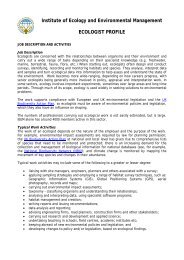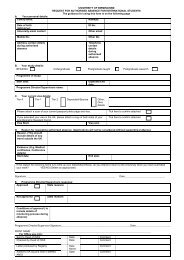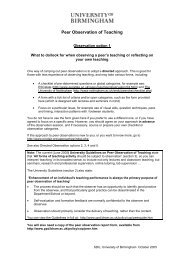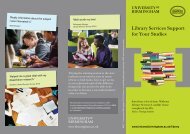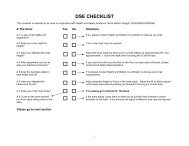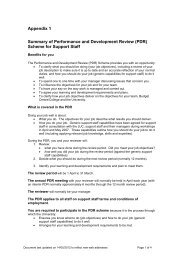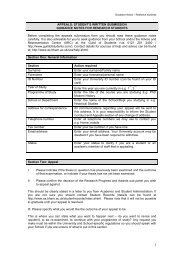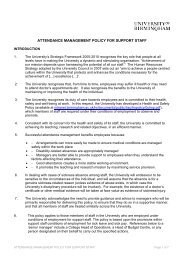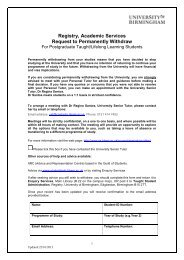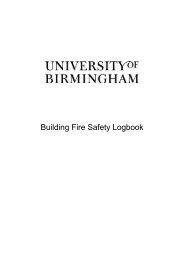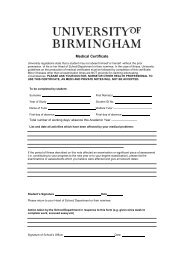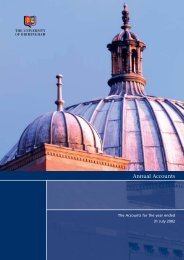Political Science and International Studies (PDF - 32KB)
Political Science and International Studies (PDF - 32KB)
Political Science and International Studies (PDF - 32KB)
Create successful ePaper yourself
Turn your PDF publications into a flip-book with our unique Google optimized e-Paper software.
2013/14POLITICAL SCIENCE AND INTERNATIONAL STUDIESClassical <strong>Political</strong> ThoughtBanner code: School/Dept: Credits: Semester:08 20889 <strong>Political</strong> <strong>Science</strong> & <strong>International</strong> 20 1 & 2<strong>Studies</strong>Description:The course is an introduction to the development of Western political philosophy from Plato toRousseau. It is concerned with an examination of the most important ideas <strong>and</strong> theoriesconcerning the relationship between man, state <strong>and</strong> society in the political thought of theAncient Greeks, the early Christians, the later Middle Ages <strong>and</strong> the early modern state. Thecourse is text based. It is expected that students will become familiar with the key texts ofpolitical thought.The course is text based. It is expected that students will become familiar with the key texts ofpolitical thought. Topics covered will be selected from the following: the nature of politicalsociety <strong>and</strong> of political activity; the relationship between moral, religious <strong>and</strong> political ideas;the nature of the state, government <strong>and</strong> authority; justice, liberty <strong>and</strong> equality; human nature<strong>and</strong> politics; law <strong>and</strong> politics; political argument <strong>and</strong> political deliberation.Assessment:Term One:1 essay x 2,000 word assessed work (30%)Term Two:1 essays x 2,000 word assessed work (30%)Term Three:2 hour examination (40%)Timetable:Staff contact:Lecture: 2.00p.mTuesday.Seminar: variousEntrancerequirements:Dr. Christopher Finlay, c.j.finlay@bham.ac.uk65
epresentations of the world.¡£ ¡§¢¤£¢¦¦¢ ¢©¢ ¡¢¤¦¦¢§¢¤¤ ¡¢£¢¤¥¡¦§¨©¤2013/14Underst<strong>and</strong>ing PoliticsBanner code: School/Dept: Credits: Semester:08 26060 <strong>Political</strong> <strong>Science</strong> & <strong>International</strong> 20 1 & 2<strong>Studies</strong>Description:This is an introductory course designed to familiarise students with a broad spectrum oftheories, approaches <strong>and</strong> issues related to the concept of power <strong>and</strong> contemporary politicalideas. The aim is to provide students with a solid foundation of key skills <strong>and</strong> knowledge uponwhich they can build their own perspectives on a number of themes <strong>and</strong> issues which theyare likely to encounter over the course of their degree programme. The course is divided intotwo main parts - the first part looks at different conceptions of politics <strong>and</strong> power, whilst thesecond half of the course examines a number of contemporary ideas <strong>and</strong> political issues.Assessment:1 x 2000 words summative assessed work (40%),2 hour examination (60%)Timetable:Lectures: Mon10.00am.Seminars: variousEntrancerequirements:Staff contact:Dr. Peter Kerr, p.kerr@bham.ac.ukIntroduction to <strong>International</strong> RelationsBanner code: School/Dept: Credits: Semester:08 20890 <strong>Political</strong> <strong>Science</strong> & <strong>International</strong> 20 1 & 2<strong>Studies</strong>Description:In this module, you are introduced to the study of international politics <strong>and</strong> the mainapproaches, theories <strong>and</strong> debates in the discipline of <strong>International</strong> Relations. The main aimsof this module are both to introduce you to some of the main issues of international politics,such as war <strong>and</strong> peace, development, regional integration <strong>and</strong> security, <strong>and</strong> to make youfamiliar with different ways to conceptualise <strong>and</strong> analyse these issues. This means that asubstantial part of this module is devoted to the introduction of the main traditional theories of<strong>International</strong> Relations <strong>and</strong> the concepts they use. While I am aware that not everyone'sinterest in studying international politics is theoretical, one of my central messages throughoutthe course is that different theoretical approaches generate different images of the world thatbuild on particular assumptions. Therefore, while you may think you know what the currentproblems of international politics are <strong>and</strong> how to solve them, one of the aims of this course isto alert you to other ways of seeing things. This should allow you to make a more confidentdecision about your own stance towards particular issues <strong>and</strong> to analyse these issues moreAssessment:2 x 1,500 word summative essay (30% each)1 x 2 hour examination (40%)Timetable:Staff contact:Lectures: Tues Entrance12.00pm.requirements:Seminar: variousDr. Marco Vieira, m.a.viera@bham.ac.uk66
economy, set within the context of contemporary political <strong>and</strong> policy debates.¦ ¢¢¦ ¡¦¥¤¥¢ ¢¦¥¢ ¤ ¡ ¡¢¢§¡©£¢ ¢£isthe2013/14Introduction to <strong>Political</strong> EconomyBanner code: School/Dept: Credits: Semester:08 20891 <strong>Political</strong> <strong>Science</strong> & <strong>International</strong> 20 1 & 2<strong>Studies</strong>Description:Introduction to <strong>Political</strong> Economy enables students to become acquainted with the style ofanalysis <strong>and</strong> the subject matter of the classical political economists. Such work is set withinthe context of a general introduction to the discipline.Semester 2 enables students to underst<strong>and</strong> the challenge to classical political economy ofneoclassical economics, while also studying twentieth century dissenters to neoclassicalAssessment:2,000 words assessed essay (50%), presentation (10%), 2 hour examination (40%)Timetable:Staff contact:Lectures: Tues3.00pmSeminar: variousTBCEntrancerequirements:Sociology of the Self <strong>and</strong> Everyday LifeBanner code: School/Dept: Credits: Semester:08 26073 <strong>Political</strong> <strong>Science</strong> & <strong>International</strong> 20 1 & 2<strong>Studies</strong>Description:This module introduces students to traditions in sociology which seek to underst<strong>and</strong> thedevelopment of individual subjectivity <strong>and</strong> everyday experience in a sociological context. Themodule explores what is distinctive about sociological accounts of individual experience. Itidentifies <strong>and</strong> draws on key concepts from the micro-sociological tradition (eg roles, rules,norms) in analysing how individuals come to make sense of <strong>and</strong> negotiate everyday settings.The question of agency extent to which individuals are the active creators of theiridentity <strong>and</strong> worldview a crucial issue in such debates. Having introduced these analyticalconcepts, the module pursues them through a series of in-depth substantive case studiesfocusing on different elements of individual experience. These will be drawn from areas suchas the experience of the self in the city, the relationship of the individual to an imagined Assessment:1 x 2000 word essay 50%; 1 x 3hr written exam 50% ¢¢¡¢££¢ £¤ ¡¢ §¨ ¦¢¤ ¢¦Timetable: TBC Entrancerequirements:NoneStaff contact:r.abbinnett@bham.ac.uk67
2013/14Introduction to the European Union: History, Politics <strong>and</strong>InstitutionsBanner code: School/Dept: Credits: Semester:08 19190 CREES, Department of <strong>Political</strong> 20 1 & 2<strong>Science</strong> & <strong>International</strong> <strong>Studies</strong>Description:The overall purpose of this module is to introduce students to the post-war division of Europeto make them familiar with developments on the two sides of the iron curtain <strong>and</strong> then assessthe prospects for the further development of the EU. The module is divided into five parts.Part 1 introduces Europe <strong>and</strong> European integration. Part 2 looks at the historical context forwestern European integration. Part 3 introduces post-war developments in East Central <strong>and</strong>Eastern Europe under Communism, again developing knowledge of particular states as wellas the system as a whole. Part 4 focuses on the historical development of the EC into theEU, bringing this evolution up to date <strong>and</strong> includes more detailed consideration of the Britishcase <strong>and</strong> integration theory. Part 5 examines developments in Central <strong>and</strong> Eastern Europefrom the collapse of the communist regimes to the 'return to diversity' <strong>and</strong> examines movestowards reuniting the continent of Europe within the EU.Assessment:1,000 word book review (10%); 2,000 word essay (20%); 3 hour written exam (70%)Timetable: Lectures: Fridays 4-5Classes: tbcEntrancerequirements:NoneStaff contact:t.j.haughton@bham.ac.uk68
2013/14Outlines of Russian HistoryBanner code: School/Dept: Credits: Semester:08 15750 & 08 15751 CREES, Department of <strong>Political</strong> 20 1 & 2<strong>Science</strong> & <strong>International</strong> <strong>Studies</strong>Description:The first semester deals with a brief general introduction to pre-Muscovite Russia - thefounding <strong>and</strong> structure of Kievan Rus' <strong>and</strong> the nature <strong>and</strong> impact of the 'Mongol yoke'. It thenproceeds chronologically through the major periods of Russian history, including Ivan IV <strong>and</strong>the consolidation of the Muscovite State, The Time of Troubles, Developments in RussianOrthodoxy, the reforms of Peter <strong>and</strong> Catherine the Great, the great peasant rebellions, TheNapoleonic Wars <strong>and</strong> finally the Decembrists Revolt of 1825.The second semester initially offers a chronological outline of major developments innineteenth century Russia up until the Emancipation of the Serfs in 1861, but also coverstopics thematically, including the development of nationalism, the growth of an urban society,the social structure of Russia in this period - the peasantry, the intelligentsia <strong>and</strong> the gentry<strong>and</strong> the nobility. It concludes with an assessment of the crucial relationship betweengovernment <strong>and</strong> society at this time.Assessment:2 x 2000 word essay (50%); 3 hour written exam (50%)Timetable: Tues (class) 2-3,Thurs (lecture) 9-10Entrancerequirements:NoneStaff contact:G.Yemelianova@bham.ac.uk69
fromthe2013/14Twentieth Century Russian PoliticsBanner code: School/Dept: Credits: Semester:08 10718 & 08 10719 CREES, Department of <strong>Political</strong> 20 1 & 2<strong>Science</strong> & <strong>International</strong> <strong>Studies</strong>Description:The turbulent history of Russia in the twentieth century is the history of world-changing eventsthe Bolshevik Revolution of 1917 <strong>and</strong> the creation of the Soviet state to the collapse ofcommunism <strong>and</strong> the disintegration of the Soviet Union in 1991. From being one of two greatsuperpowers to fifteen separate states, struggling for identity <strong>and</strong> survival rise <strong>and</strong> fall ofthe Soviet Union provides a unique case study touching on many aspects of global politicalaffairs in the twentieth century.the development of the Soviet state <strong>and</strong> the establishment of the Soviet Union as a worldsuperpower. The second part covers the government <strong>and</strong> ideology of the Soviet Union <strong>and</strong>examines the factors leading to its collapse.¢¢£¨ £ ¡¢¤ ¡ ¦ £ £¡£ ¡ ¡¢¤£¢£©¢The module is taught by weekly one-hour lectures <strong>and</strong> one-hour seminars. Seminar groupswill be small enough to allow for participation <strong>and</strong> questions <strong>and</strong> will explore in greater depththe themes emerging from the lecturesTwentieth Century Russian Politics is brought to you by the Centre for Russian <strong>and</strong> EastEuropean <strong>Studies</strong> but is open to everybody! In previous years, students majoring in Politics,History, English, European <strong>Studies</strong>, Modern Languages, Geography, Economics <strong>and</strong> manyother subjects have chosen Twentieth Century Russian Politics as a Level One module.Assessment:3 hour examination (50%); 2 x 2500 word assessed essays (25% each)Timetable: TBC Entrancerequirements:NoneStaff contact:D.J.White.1@bham.ac.uk70



